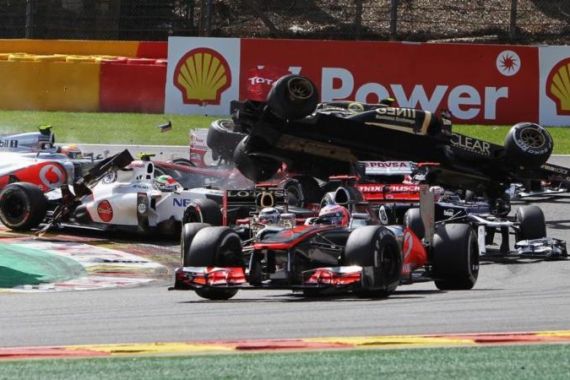Grosjean: ‘Sometimes we make mistakes’
With the Singapore GP planning to honour late safety pioneer Sid Watkins, Romain Grosjean talks of his recent ban.

Lotus rookie Romain Grosjean said he hoped to come back a stronger driver at the Singapore Grand Prix after his one-race ban for causing a dangerous pile-up in Belgium.
Ahead of a race where Formula One will honour late safety pioneer Sid Watkins, Grosjean vowed to learn from Spa-Francorchamps, where he crashed and dramatically flew over Fernando Alonso’s Ferrari at the first corner.
Keep reading
list of 4 itemsWhat happens when activists are branded ‘terrorists’ in the Philippines?
Are settler politics running unchecked in Israel?
Post-1948 order ‘at risk of decimation’ amid war in Gaza, Ukraine: Amnesty
“When you have a tough time, if you come back you are stronger, so hopefully we are,” said the 26-year-old Frenchman on Thursday, who is in his debut season.
“We are professional drivers, sometimes we make mistakes. I accepted I made one, that was ok and the consequences were quite big. I was the first one to be happy that nobody got hurt in this incident.
“Then the decision was a hard one, but we accepted it, and from there we move forward.”
The crash in Belgium prompted Ferrari’s team chief to call for an improvement in driving standards, and left championship leader Alonso counting his lucky stars he wasn’t injured by Grosjean’s airborne car.
Remembering Watkins
But Grosjean insisted he wasn’t the only driver to make a mistake in Formula One, which regularly sees less dramatic crashes.
“It’s a bit more complex than just being extra-cautious, but we’ll try to learn from the difficult time and improve ourselves,” he said.
“Do you think that if I’m not on the grid there won’t be any crash forever? That’s a bit silly, to be honest.”
|
“It’s a bit more complex than just being extra-cautious, but we’ll try to learn from the difficult time and improve ourselves” Lotus driver Romain Grosjean |
Sunday’s race will be preceded by a minute’s applause to mark the death of Watkins, whose innovations are credited with helping ensure Formula One has suffered no fatal accidents since Ayrton Senna was killed in 1994.
The neurosurgeon’s death this month at the age of 84 was greeted by an outpouring of emotion from teams and drivers including Rubens Barrichello, whose life he saved at Imola in 1994 – the same race where Senna died.
Grosjean admitted it was tough to make the right decision in a split-second, in a highly competitive and stressful environment.
“It’s very tight between taking the right decision and taking the wrong decision. It might be one-tenth of a second or less and there’s a lot of stress at this time (the start) of the race,” he said.
“So it comes with experience, to know what to do, to take the right decision but as well with the preparation.”